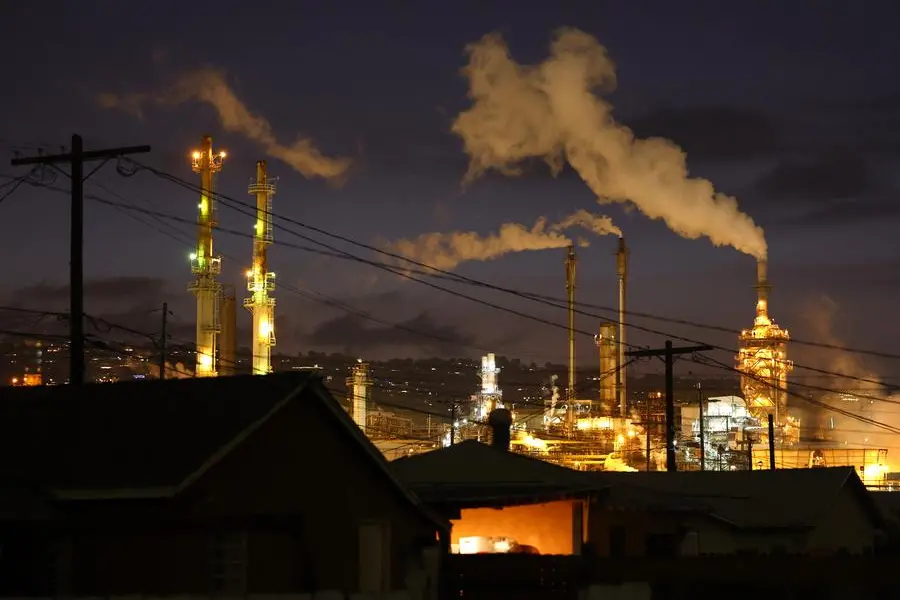PHOTO
Joe Biden's administration announced Friday it was pausing new liquified natural gas (LNG) export facilities, citing the urgent need to tackle the climate crisis by accelerating the transition from fossil fuels.
It comes as the president looks to shore up his liberal base in a tough election rematch later this year against likely Republican candidate Donald Trump, who has falsely called human-caused global warming a "hoax" and vowed to torpedo his Democratic opponent's climate agenda.
"This pause on new LNG approvals sees the climate crisis for what it is: the existential threat of our time," said Biden in a statement. "While MAGA Republicans willfully deny the urgency of the climate crisis, condemning the American people to a dangerous future, my Administration will not be complacent."
The US is the world's leading LNG exporter, averaging 11.6 billion cubic feet (328 million cubic meters) per day according to the tracker CEDIGAZ, with seven terminals currently in operation.
Under the plan, new export applications would be subjected to an indefinite review considering climate and wider environmental and economic impacts.
Facilities impacted include Venture Global's proposed Calcasieu Pass 2 (CP2) in Louisiana, which would be the biggest terminal in the country and release the equivalent annual emissions of 42-million cars, according to a letter penned to Biden in December by 170 scientists.
Scientists and environmental activists welcomed the move.
"It's very important and appropriate for the administration to conduct a wide review to really understand the implications of exporting natural gas, particularly expanding capacity at this point in time," Dan Lashof, director of the nonprofit World Resources Institute, told AFP.
He added that while a transition to renewables would eventually happen no matter who was president, "if there is a government policy of green lighting new fossil fuel supplies, at a minimum that will be slowing down the transition at a time when we should be accelerating."
Fossil fuel industry groups reacted strongly. The Independent Petroleum Association of America said in a statement the plan would "bolster Russian influence" in the European gas market.
But according to a recent letter by 60 European parliamentarians to Biden, while US LNG had previously helped the continent avoid an energy crisis brought on by Russia's invasion of Ukraine, EU member states are now reducing their gas demand.
"Europe should not be used as an excuse to expand LNG exports that threaten our shared climate and have dire impacts on US communities," they wrote.
- Decimated coastline and fishing industry -
Robert Howarth, an environmental scientist at Cornell University, told AFP that while natural gas has something of a reputation as a cleaner fossil fuel in the eyes of the public, "that's based on advertising from the oil and gas industry."
While it does produce less carbon when burned than coal and oil, this does not factor in the full lifecycle of production and transport to end users, which involves leaks of the powerful greenhouse gas methane throughout.
According to his research, the overall greenhouse impact of LNG is roughly 25 percent worse than coal even when the best technologies are employed.
Exporting LNG was barred until 2016 in order to safeguard the domestic supply of gas, but the ban was lifted following a decade-long fracking boom -- and the exports have led to gas and electricity price hikes to US consumers too, added Howarth.
For Anne Rolfes, director of the campaign group Louisiana Bucket Brigade, the pause couldn't come soon enough for the state, where existing LNG development has destroyed coastal wetlands and left residents more vulnerable to the impacts of hurricanes.
"People have already had to move away because of rising sea level and increasing storms, yet this industry plans to build on that fragile coast," she told AFP.
Fisherman Travis Dardar added that catches were down by more than 50 percent in his native Cameron Parish, as LNG companies bought and tore down fishing docks.
"They're sacrificing the seafood industry for the petrochemical industry," he told AFP.





















